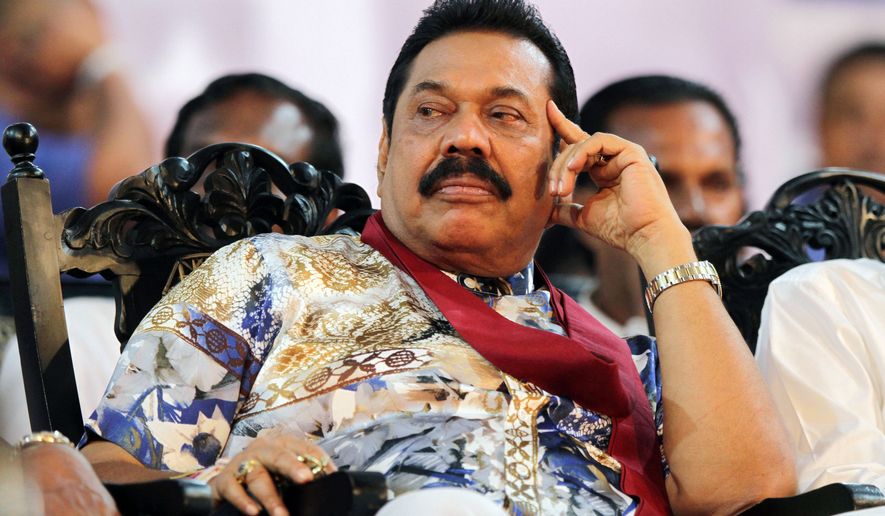Sri Lanka’s presidential election earlier this month dealt China a major blow as opposition leader Maithripala Sirisena, who had made curtailing excessive Chinese influence the main focus of his campaign, won a surprise victory over the Beijing-friendly incumbent President Mahinda Rajapaksa.
The Global Times, China’s leading international politics and security newspaper, published a somber editorial on Jan. 20 bemoaning the Sri Lankan result. The editorial draws a parallel to China’s overly eager investment in Myanmar in the past, only to see those projects rejected, curtailed or canceled by a newly elected anti-China leader.
“The risk we are facing in today’s Sri Lanka once again should remind us that we should have placed several more layers of insurance on some countries’ political uncertainty,” the Global Times editorial stated, “even though it’s easier said than done in this regard.”
China has eyed the Indian Ocean nation over the past decade as the key link connecting and commanding some major maritime and strategic choke points of the world, including one of the most crucial sea lanes of communication that passes through the country.
As a result, China has lavishly spent on Sri Lanka, especially its military and the nation’s infrastructure, culminating in June 2012 when Beijing surprised the world by announcing a whopping $50 billion plan to rebuild Sri Lanka’s key military and civilian infrastructure over the next 10 to 15 years.
In particular, China spent billions to build the deep-sea ports of Hambantota and Colombo, which allowed the Chinese nuclear- and conventional-powered submarines to dock last year, prompting security alarms from New Delhi and Tokyo to Washington.
However, Sri Lanka’s overreliance on China and China’s dominant role in Sri Lanka’s economy and government have backfired among voters. The pro-Beijing incumbent Mr. Rajapaksa was soundly defeated by the more skeptical Mr. Sirisena, with a 51.28 percent versus 47.58 percent of all votes.
Mr. Sirisena has vowed to balance the nation’s relationship with all friendly nations, especially India, Pakistan and Japan, and not just focus on China. He has also vowed to stop several key Chinese-operated projects immediately, including the $1.4 billion project to modernize the port of Colombo.
Mr. Sirisena’s approach has not been taken lightly by Beijing, and the agony of defeat is palpable in state-controlled media outlets, which rarely admits any faux pas of China’s international diplomacy.
“China is obviously lagging behind in securing insurances against political precariousness in targeted foreign countries during the process of China’s global outreach campaign,” said the Beijing-based Global Times. “Our comprehensive diplomatic strength does not match the demand for dealing with composite risks overseas. [China’s global outreach] is destined to encounter risks, [and] sometimes these risks make us sweat in fear.”
It seems that money alone really can’t buy friends.
General, likely corruption target, dies
Gen. Zhang Wannian, the most powerful Chinese People’s Liberation Army officer between 1995 and 2003 as the vice chairman of the Chinese Communist Party’s Central Military Commission, died on Jan. 14 at the age of 87.
Gen. Zhang was a pivotal figure in some of the most important military affairs under General Secretary Jiang Zemin. In 1997 Gen. Zhang was the only senior military representative at the 1997 Hong Kong handover ceremony, but he was mostly remembered for advocating for and conducting a missile exercise to intimidate Taiwanese voters in March 1996 in the island democracy’s first-ever direct presidential election. In response, the U.S. government dispatched two nuclear-powered aircraft carriers to the waters off Taiwan to deter further military intimidation.
Gen. Zhang was known as Mr. Jiang’s loyal henchman inside the Communist Party Politburo. He was reported to have engineered a semicoup in the inner sanctum of the Party to allow Mr. Jiang to retain his control over the PLA for two more years after Mr. Jiang’s handover of power to successor Hu Jintao. That move by Gen. Zhang was deeply resented by Mr. Hu and reportedly also by Xi Jinping, China’s current supreme leader.
Some analysts believe that Mr. Xi’s current anti-corruption campaign inside the PLA initially targeted Gen. Zhang, whose most influential protege inside the PLA was Lt. Gen. Gu Junshan, the very first corrupt senior military official — dubbed by Mr. Xi as “tiger” — to fall under the sweeping anti-graft campaign.
Gen. Gu began his meteoric rise in 2001 and was promoted by Gen. Zhang to run the PLA’s lucrative base and barracks construction department. When Gen. Gu published a self-glorifying autobiography, Gen. Zhang wrote a maudlin preface.
However, Gen. Gu was purged two years ago by Mr. Xi as the moneyman in the PLA who had bribed many key army leaders during Mr. Hu’s reign, including the recently purged former CMC Vice Chairman Gen. Xu Caihou.
Some military analysts believe that if Zhang Wannian had not died, he would certainly become the next fallen “tiger” under Mr. Xi’s binge of purges inside the PLA.
• Miles Yu’s column appears Fridays. He can be reached at mmilesyu@gmail.com and @Yu_miles.
• Miles Yu can be reached at yu123@washingtontimes.com.




Please read our comment policy before commenting.